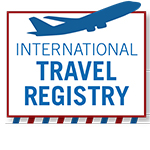Whether it’s political unrest or a natural disaster, Washington University’s new International Travel Registry can speed up response time or assistance if students, faculty or staff encounter turbulence abroad.

Last year, the university instituted a new international travel policy and piloted a registration system for travelers over the last six months. The registry is now ready for the campus community to input their university-related travel plans, says Shanon Langlie, global projects manager.
Undergraduate students traveling on research or university-sponsored trips must register through the service under the new policy. Faculty and staff on university-related trips are strongly encouraged to register.
“We have a number of resources available for travelers. The downside of not registering international travel plans is that if there is political turmoil or a natural disaster such as a tsunami and we don’t know that you’re there on university business, we may not be able to provide assistance,” Langlie says.
Those resources include information about international health insurance, medical assistance and security advice and assistance. Through a contract with the International SOS service, WUSTL travelers can get help through a 24-hour service center, including finding a doctor or hospital.
“If they register, we can get them connected to university resources quickly,” Langlie says.
Registration also ensures that the university can update concerned family members back home.
With issues such as uprisings during the Arab spring, tsunamis in Japan and Thailand, or even earthquakes and volcanic eruptions in Europe, travelers never know when they might need help. When a major tsunami swept through Northern Japan in 2011, a WUSTL graduate student was in Kyoto working on a project.
“His professor knew he was there, but we didn’t,” says Priscilla Stone, PhD, assistant provost for international education and director of Overseas Programs and undergraduate studies for International and Area Studies in Arts & Sciences. “We wanted to make sure he was OK, and he was.”
During the Arab spring in 2011, two students had to be evacuated from Egypt when violence erupted.
“Getting those students out of Egypt was pretty dramatic. The airport was congested, and there was a lot of uncertainty. But we have good institutional partners on the ground and they managed the evacuation process in close consultation with us,” Stone says.
Junior Mahroh Jahangiri spent last summer in Cairo teaching as part of a Social Change Grant through the Gephardt Institute for Public Service. The Charlottesville, Va., major in international and area studies registered her fall semester stay at American University in Cairo.
“I’ve witnessed many of the protests in Tahrir Square since May out of curiosity and academic interest,” she says. “I have never been harassed or witnessed violence against anyone, but I attended the embassy protests a few weeks ago, and was tear-gassed while taking pictures.”
While students, faculty and staff occasionally encounter difficult conditions as part of their research or activities, the university urges each traveler to follow U.S. State Department travel warnings that could affect their property or lives, says Mark A. Beirn, associate director of Overseas Programs.
“These recommendations generally include avoiding areas where large gatherings occur, such as demonstrations or protests, as they can turn confrontational and escalate into violence, as well as deferring nonessential travel to areas of high risk,” Beirn says.
About 600 students travel abroad each year, Stone says. The university has no way of tracking how many faculty go overseas because they aren’t required to register their trips.
The university wanted to bolster its travel registry requirements because so many more students and faculty are going overseas these days, Stone says.
“More and more of what we do as a university has a global reach. We used to send people primarily to Western Europe, but now there is an effort to get them to less commonly traveled areas of the world such as Africa or central Asia,” she says. “This makes it ever more important that we have systems in place at WUSTL that allow us to quickly gather information and respond to crises as they occur, no matter where that might be.”